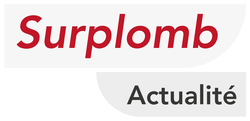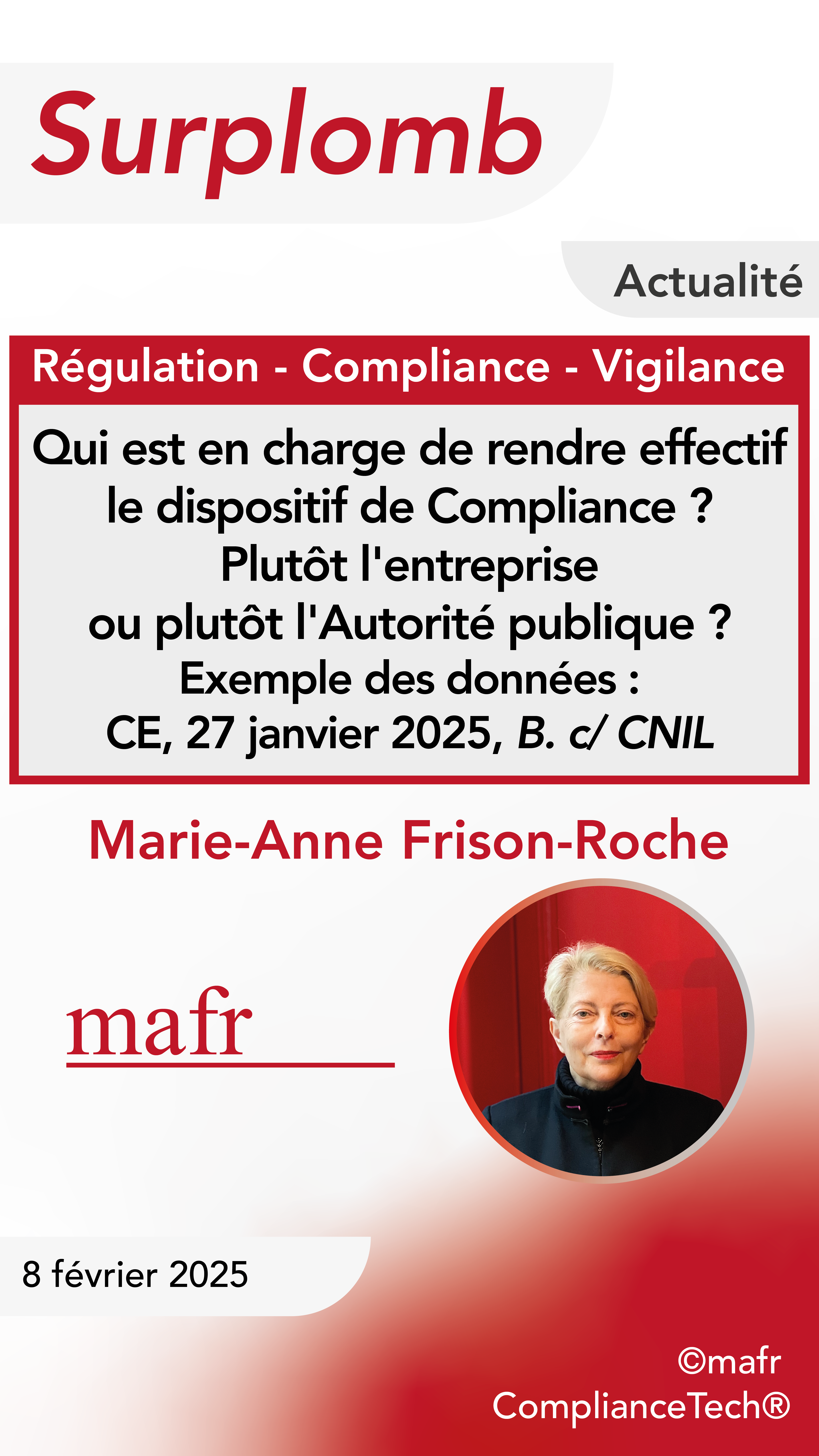Thesaurus : 07. Cours d'appel
Référence : Grenoble, 5 nov. 2020, I.D. c/ Société Corin France
Thesaurus : Doctrine
Référence complète : Boursier, M.-E., L’irrésistible ascension du whistleblowing en droit financier s’étend aux abus de marché, Bulletin Joly Bourse, 1ier septembre 2016.
Les étudiants de Sciences po peuvent lire l'article en accédant au dossier "MAFR - Régulation"
Sept. 4, 2025
Thesaurus : Doctrine

► Full Reference: G. Loiseau, "L’intensité de l’obligation de vigilance selon les secteurs : le cas des opérateurs numériques" (The intensity of the Duty of Vigilance in different sectors: the case of digital operators), in M.-A. Frison-Roche (dir.), L'obligation de Compliance, Journal of Regulation & Compliance (JoRC) and Dalloz, coll. "Régulations & Compliance", 2024, forthcoming
____
📕read the general presentation of the book, L'obligation de Compliance, in which the contribution is published
____
► English summary of this contribution (done by the Journal of Regulation & Compliance - JoRC) : L'auteur développe le cas des opérateurs numériques. Il souligne le paradoxe d'un Droit qui est parti d'un texte qui a posé le principe de l'irresponsabilité des hébergeurs, en raison de leur neutralité technique, pour aboutir au DSA et leur imposer des diligences, mais il rappelle que cette obligation n'apparaît qu'à partir d'un signalement qui est porté auprès de l'opérateur numérique et une interdiction expresse d'une obligation générale de surveiller les informations. Moreover, there is no general duty of vigilance incumbent on digital operators, even if recent case law seems to be tightening the role imposed on hosting providers.
The Monumental Goal here is to fight against illegal content, but freedom of expression must also be preserved and regulations vary according to the type of content, whereas the DSA has a more general conception, aims at a logic of accountability and prevention of systemic risks. But wanting to make platforms 'accountable' ex ante, without touching the liability regime ex post, may pose a problem.
The duty of vigilance will vary depending on whether the digital operator plays a passive or active role. This may lead platforms to adopt prior measures that may constitute structural obligations, with the trusted third party taking the form of a trusted signaller. The platform is thus made responsible for its own vigilance, but despite the possibility of enhanced vigilance, this does not have to extend to investigative measures. There are, however, specific enhanced vigilance obligations for very large platforms, justified by the risks involved and the types of content (terrorism, pornography).
____
🦉This contribution est available in full text for persons following Professor Marie-Anne Frison-Roche teaching
________

Feb. 8, 2025
MAFR TV : MAFR TV - Overhang

🌐suivre Marie-Anne Frison-Roche sur LinkedIn
🌐s'abonner à la Newsletter MAFR. Regulation, Compliance, Law
🌐s'abonner à la Newsletter Surplomb, par MAFR
____
► Référence complète : M.-A. Frison-Roche, "Qui est en charge de rendre effectif le dispositif de Compliance ? Plutôt l'entreprise ou plutôt l'Autorité publique ? Exemple des données : CE, 27 janvier 2025, B. c/ CNIL", in série de vidéos Surplomb, 8 févroer 2025
____
🌐visionner sur LinkedIn cette vidéo de la série Surplomb
____
____
🚧lire le document de travail bilingue sur la base duquel cette vidéo a été élaborée
____
► Résumé de ce Surplomb : Dans sa décision du 27 janvier 2025, le Conseil d'État eut à apporter une solution à un cas que les règles de Compliance applicable en matière de données n'avaient pas expressément prévu. Une personne qui estime qu'une autre a méconnu ses obligations imposées par le RGPD peut-elle saisir la CNIL et non pas le responsable de traitement ?
Le Conseil d'Etat estime que la question est claire, qu'il n'est pas utile de poser une question préjudicielle à la CJUE. En effet, les textes imposent à celui qui allègue la méconnaissance de son droit de se tourner d'abord vers le responsable du traitement pour que l'information soit effacée avant de saisir dans un second temps la CNIL. En outre, il s'agissait en l'espèce d'informations personnelles insérées par des médecins dans un rapport d'expertise versé dans une instance judiciaire. Le Conseil d'Etat approuve la CNIL d'avoir estimé qu'elle n'a pas à contrôler et à apprécier les éléments de preuve, ce qui relève de l'office du juge judiciaire.
L'on mesure ici que, si par ailleurs sur la base du droit d'alerte la saisine d'autorités administratives peut être directe, ici le spécifique l'emporte sur le général, l'esprit de la loi confiant la préservation directe des droits au responsable du traitement, la CNIL ne devant venir dans son office de supervision et de hashtag#sanction que dans un second stade. Cela illustre ce qu'est le Droit de la Compliance d'une façon plus générale, qui repose en premier lieu sur les opérateurs eux-mêmes. En outre, creuset de droits subjectifs divers, ici droit à l'hashtag#effacement mais aussi droit de verser des preuves aux débats, le Conseil d'Etat souligne que c'est ici l'office du juge judiciaire de veiller à la loyauté des débats.
____
🎬visionner ci-dessous cette vidéo de la série Surplomb⤵️
____
Surplomb, par mafr
la série de vidéos dédiée à la Régulation, la Compliance et la Vigilance


Jan. 22, 2024
Thesaurus : Doctrine
► Référence complète : J.-B. Barbièri, "Devoir de vigilance : la fin du début ?", JCP G, n° 3, 22 janvier 2024, note 85, pp. 126-129
____
► Résumé de l'article (fait par l'auteur) : "Solution. - Le juge, en présence d’un plan de vigilance incomplet, peut enjoindre la société défaillante de le compléter, mais ne peut pas s’y substituer pour faire adopter des mesures spécifiques. Il peut en revanche enjoindre à la société « d’élaborer [...] des actions complémentaires plus concrètes et efficaces en lien le cas échéant avec un risque identifié ».
Impact. - Les plaideurs prendront attention à ne pas solliciter des mesures spécifiques qu’ils souhaiteraient voir adoptées par l’invocation du plan de vigilance. En revanche, en présence d’un « risque identifié », ce qui suppose qu’il le soit, ils pourront demander au juge des « actions complémentaires », dont l’étendue reste à déterminer. Du côté de l’élaboration du plan, il importe que les risques soient correctement identifiés, le standard à suivre étant que le plan « doit permettre au public et aux parties prenantes de connaître l’identification précise des risques », faute de quoi les mesures d’atténuation des risques seraient d’office insuffisantes.".
____
🦉Cet article est accessible en texte intégral pour les personnes inscrites aux enseignements de la Professeure Marie-Anne Frison-Roche
____
Jan. 22, 2024
Thesaurus : Doctrine
► Référence complète : A. Oumedjkane, "Le tribunal judiciaire de Paris livre sa première interprétation de la loi relative au devoir de vigilance", JCP A, n° 3, 22 janvier 2024, commentaire 2016, pp. 1-3
____
► Résumé de l'article (fait par l'auteur) : "Solution. – Après de longs parcours judiciaires, une première affaire relative au devoir de vigilance d’une société a donné lieu à un jugement au fond.
Impact. – C’est l’occasion pour le juge de clarifier tout à la fois ses attendus quant aux mesures qui doivent composer le plan de vigilance et le rôle qu’il entend jouer à travers l’utilisation de ses pouvoirs d’injonction."
____
🦉Cet article est accessible en texte intégral pour les personnes inscrites aux enseignements de la Professeure Marie-Anne Frison-Roche
________
Jan. 17, 2024
Thesaurus : Doctrine

► Référence complète : M. Lancri, "La réception des alertes par l'avocat", in M.-A. Frison-Roche et M. Boissavy (dir.), Compliance et droits de la défense. Enquête interne – CJIP – CRPC, Journal of Regulation & Compliance (JoRC) et Dalloz, coll. "Régulations & Compliance" à paraître.
____
📕consulter une présentation générale de l'ouvrage, Compliance et droits de la défense - Enquête interne, CIIP, CRPC, dans lequel cet article est publié
____
► Résumé de l'article (fait par le Journal of Regulation & Compliance - JoRC) : L'auteur rappelle tout d'abord toute l'évolution législative, aussi bien française qu'européenne, sur le mécanisme de l'alerte qui est lié au processus des enquêtes, les droits qui en découlent et les dispositifs techniques que les entreprises ont établis en conséquence.
Puis l'article met en valeur l'intérêt que chacun à confier à un avocat le résultat des alertes, résultat sur la base duquel des enquêtes seront déclenchés par les entreprises. L'auteur met en valeur que la procédure de réception des alertes ne doit pas se limiter à une réception mécanique mais doit intégrer les secrets et anticiper l'enquête qui va s'ouvrir, ce que par nature fait un avocat. En effet, l'auteure insiste sur le fait que l'avocat va accroître les garanties sur le respect de la confidentialité, sur le traitement effectif de l'alerte et sur la limitation du risque de représailles. D'une façon plus générale, elle développe l'idée que l'avocat aide à rassurer les différentes personnes impliquées.
____
🦉Cet article est accessible en texte intégral pour les personnes inscrites aux enseignements de la Professeure Marie-Anne Frison-Roche
________
Jan. 1, 2023
Thesaurus : Doctrine
► Référence complète : W. Feugère, "Les suites des alertes : observations sur les enquêtes internes", in W. Feugère (dir.), Le nouveau régime des dispositifs d’alerte en France : comment conjuguer conformité et efficacité, Cahiers de droit de l'entreprise (CDE), n° 1, janvier-février 2023, pp. 49-52.
____
►Résumé de l'article (fait par l'auteur) : "L’analyse du droit des alertes ne peut se concevoir que dans celle des enquêtes, qui en sont la suite incontournable. L’alerte est une information brute : elle doit être analysée, au-delà de sa seule recevabilité. Quels sont les faits exacts ? Quelle en est l’ampleur ? Quels en sont les enjeux et les impacts, les responsabilités ? Enfin, et surtout, qu’en conclure, que décider ? Une information doit donner lieu à réflexion et à une décision. L’enquête a précisément cet objectif : mettre en mesure les managers de décider.".
____
🦉Cet article est accessible en texte intégral pour les personnes inscrites aux enseignements de la Professeure Marie-Anne Frison-Roche
________
Updated: Sept. 1, 2022 (Initial publication: Nov. 4, 2021)
Publications

🌐 follow Marie-Anne Frison-Roche on LinkedIn
🌐 subscribe to the Newsletter MAFR Regulation, Compliance, Law
____
► Full Reference: M.-A. Frison-Roche, "Appréciation du lancement d'alerte et de l'obligation de vigilance au regard de la compétitivité internationale" ("Assessment of whistleblowing and of the obligation of vigilance with regard to international competitiveness"), in M.-A. Frison-Roche (ed.), Les Buts Monumentaux de la Compliance, coll. "Régulations & Compliance", Journal of Regulation & Compliance (JoRC) and Dalloz, 2022, p. 413-436.
____
📝read the article (in French)
____
🚧read the bilingual Working Paper which is the basis of this article, with additional developments, technical references and hyperlinks
____
📕read a general presentation of the book, Les Buts Monumentaux de la Compliance, in which this article is published
____
► English summary of the article (done by the Journal of Regulation & Compliance): Taking up the legal tools of Compliance and confronting them with the concern that Law must have for the Competitiveness of companies, it is necessary that these legal instruments not harm it because Compliance Law, because of its immense ambitions, can only function through an alliance between political wills with great pretensions (save the planet) and the entities which are able to achieve these goals (the crucial economic operators : the political drawing on the compagnies" power, it would be contradictory for the legal instruments put in place by Law to harm the ability of companies to face global economic competition, or worse to favor international competitors acting under legal systems which do not integrate Compliance obligations.
From this principle, it is possible to assess these two legal techniques of whistleblowing and vigilance obligation: both consist in capturing Information, which gives them a strong uniqueness and fits them into the global competition for Information.
Taking the whistleblowing, its first beneficiary is the company itself since the firm discovers a weakness and can therefore remedy it. Therefore, beyond the principle of protection of the whistleblower by their access to the legal statute, for instance the one conceived by the French 2016 law known as "Sapin 2", it is questionable that all the incentives are not put in place so that the holder of such information transmits it to the manager. It is not the European solution, even after the European Directive of 2019, national legal systems continuing to require the absence of financial compensation, the "heroic figure of the whistleblower and the refusal of their remuneration depriving the company of Information and improvement. First to the manager, with external transmission taking place if the latter does nothing, the internal manager is thus encouraged to act and put an end to the dysfunction, which increases the competitiveness of the company.
But the French legislation has on the contrary developed the right incentive as to the person to whom the information is transmitted because by obliging to transmit first to the manager, the external transmission intervening if the internal management does nothing, the incentive is thus made to the internal manager to act and put an end to the dysfunction, this legal solution increasing the competitiveness of the company.
Even more, and even if it seems counter-intuitive, the obligation of vigilance increases the competitiveness of the obliged companies. Indeed, Law by obliging them to prevent and fight against violations of human rights and the environment has tacitly given them all the necessary powers to do so, notably the power to collect Information on third-party companies, including (and even above all) those which are not subject to transparency obligations. In this respect, companies, as far as they are personally responsible, hold supervisory power over others, a power which allows to globalize Compliance Law and which, in the process, increases the Companies' own power. Therefore, the obligation of vigilance is in many respects a boon for the companies which are subject to it. The resumption of the mechanism by the next European Directive, itself indifferent to the territory, will only strengthen this global power of vigilant companies over possibly foreign companies which become its passive subjects.
________
June 16, 2022
Thesaurus : Doctrine
► Référence complète : Th. Saupin, "L’articulation entre le dispositif commun et les dispositifs sectoriels, l’exemple du droit bancaire et financier", in Fr. Drummond & J. Icard (dir.), Le nouveau cadre légal des lanceurs d’alerte, JCP E, n° 24, 16 juin 2022, étude 1216, pp. 35-39
____
► Résumé de l'article (fait par l'auteure) : "La loi du 21 mars 2022, qui transpose la directive Lanceurs d’alerte, est venue renforcer la protection du lanceur d’alerte, elle tente également de l’articuler avec les dispositifs sectoriels existant dans les domaines bancaires et financiers.".
____
🦉Cet article est accessible en texte intégral pour les personnes inscrites aux enseignements de la Professeure Marie-Anne Frison-Roche
_______
June 23, 2021
Thesaurus : Doctrine

► Full Reference: Siproudhis, J.-B.,, C., Le transfert de responsabilité du régulateur et du juge vers l’entreprise : la démonstration par le système d’alerte ("The transfer of responsibility from the regulator and the judge to the company: demonstration by the whistleblowing mechanism"), in Frison-Roche, M.-A. (dir.), La juridictionnalisation de la Compliance, série "Régulations & Compliance", Journal of Regulation & Compliance (JoRC) et Dalloz, à paraître.
___
► Article Summary (done by the Author) : From the practitioner perspective, compliance is geared towards a gradual transfer of responsibilities from both regulators and judges.
In France, the whistleblowing mechanism imposed by the so-called "Sapin 2" and "Duty of Vigilance" laws illustrates this evolution. Indeed, internal alerts management follows key judiciary process milestones : admissibility, investigations, dismissal or sanction.
This turns corporations duties into prosecutors or judges’, provided that they respect a specific framework contributing to respect the rules of a fair trial.
This requirement raises several legal and sociological challenges to which the author devotes his developments.
____
📝 go to the general presentation of the book in which this article is published.
__________
This requirement raises several legal and sociological challenges to which the author devotes his developments.
June 23, 2021
Thesaurus : Doctrine

► Full Reference: Siproudhis, J.-B.,, C., The transfer of responsibility from the regulator and the judge to the company: demonstration by the whistleblowing mechanism, in Frison-Roche, M.-A. (ed.), Compliance Jurisdictionalisation, series "Compliance & Regulation", Journal of Regulation & Compliance (JoRC) and Bruylant, to be published.
___
► Article summary (done by the author) : From the practitioner perspective, compliance is geared towards a gradual transfer of responsibilities from both regulators and judges.
In France, the whistleblowing mechanism imposed by the so-called "Sapin 2" and "Duty of Vigilance" laws illustrates this evolution. Indeed, internal alerts management follows key judiciary process milestones : admissibility, investigations, dismissal or sanction.
This turns corporations duties into prosecutors or judges’, provided that they respect a specific framework contributing to respect the rules of a fair trial.
This requirement raises several legal and sociological challenges to which the author devotes his developments.
____
📝 to the general presentation of the book in which this article is published